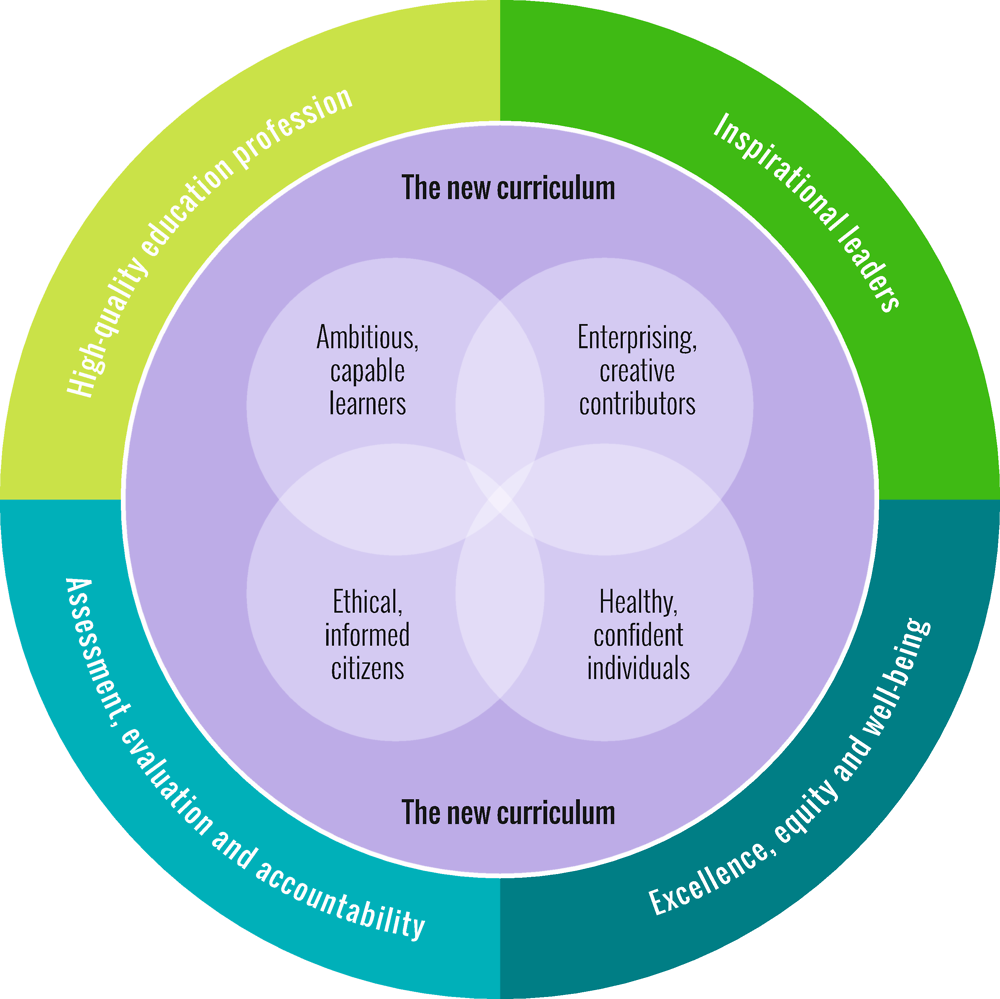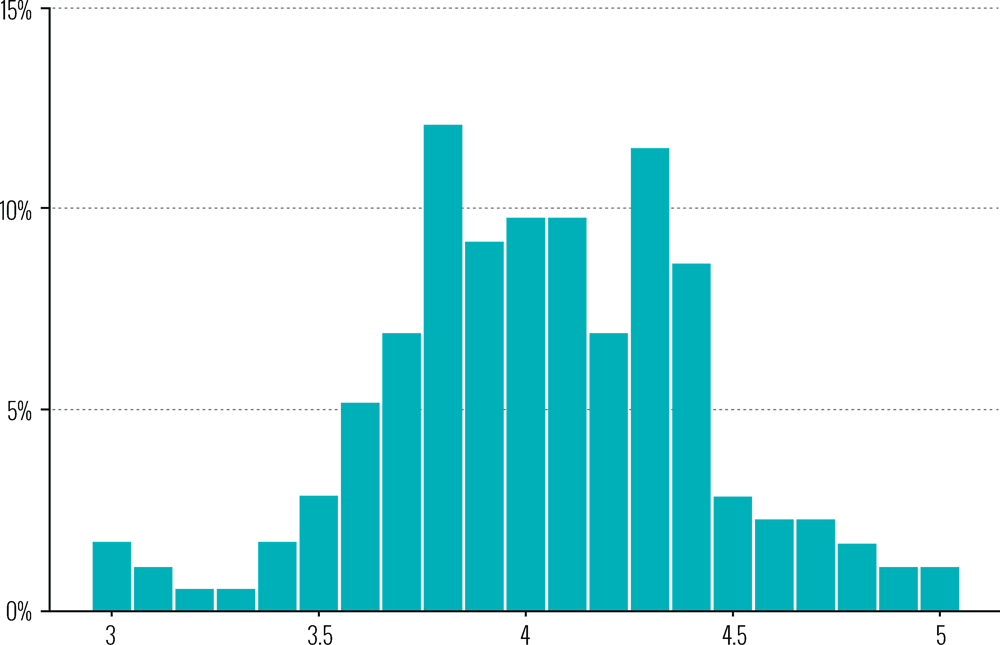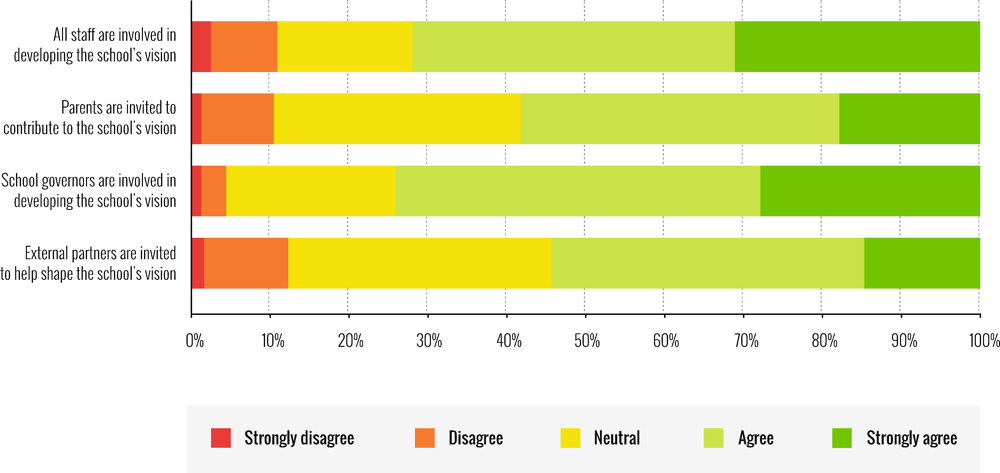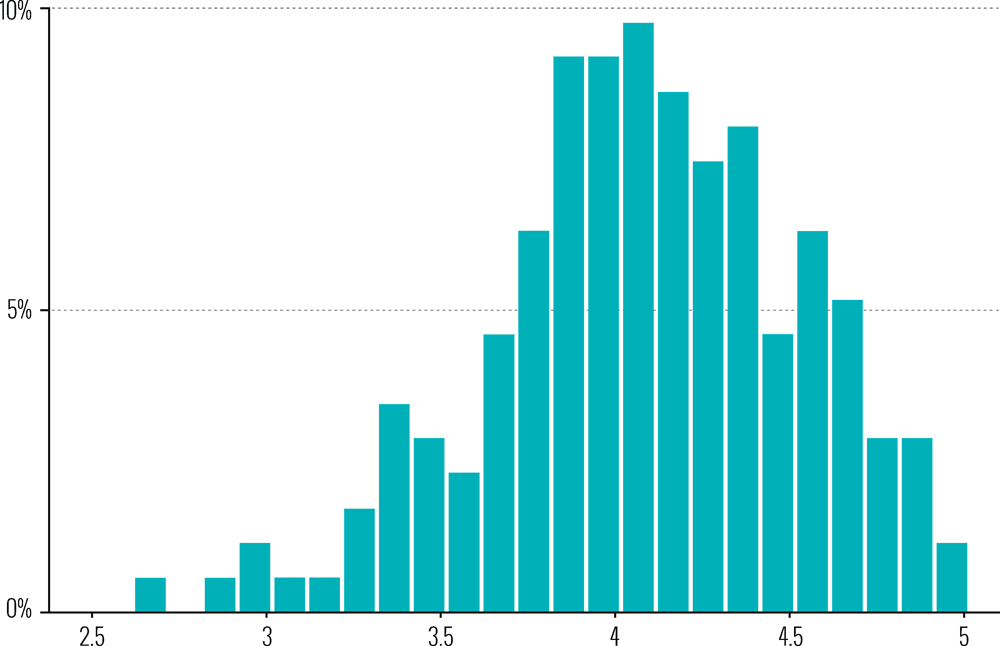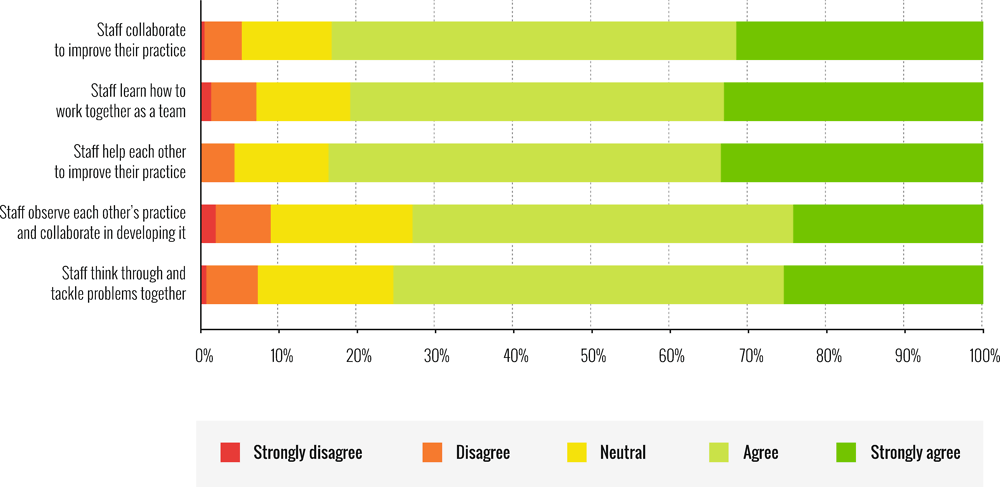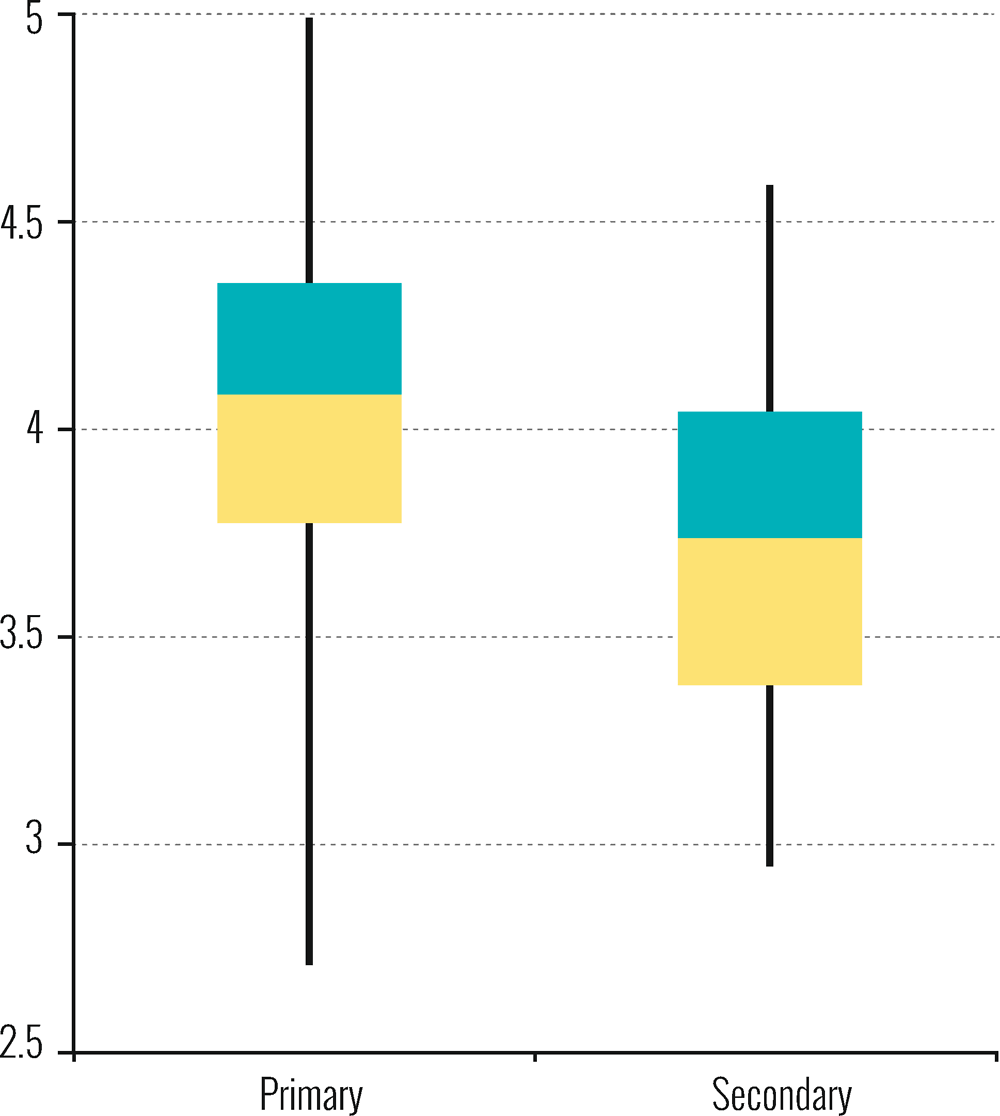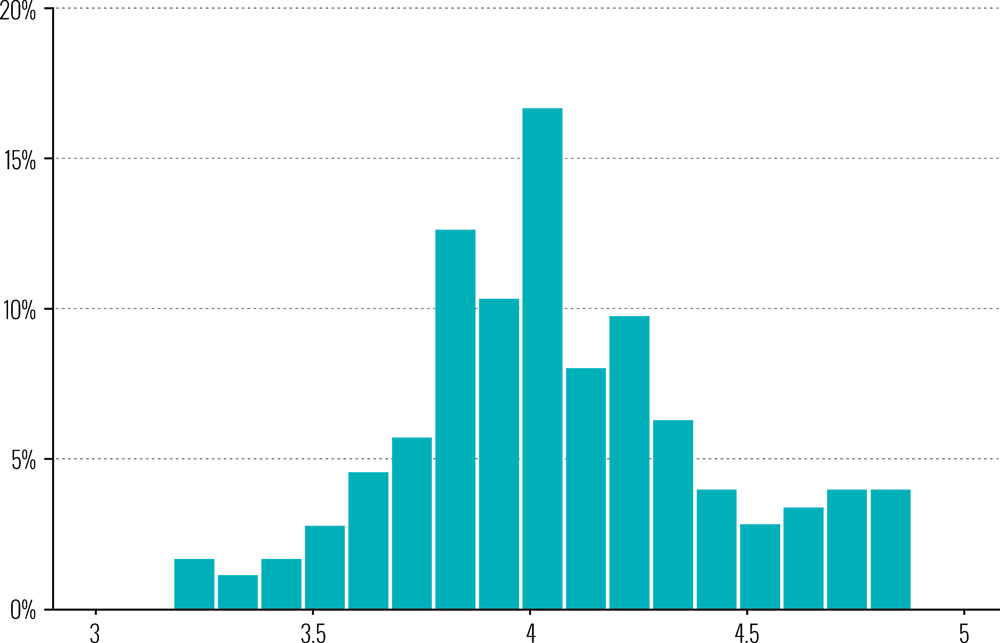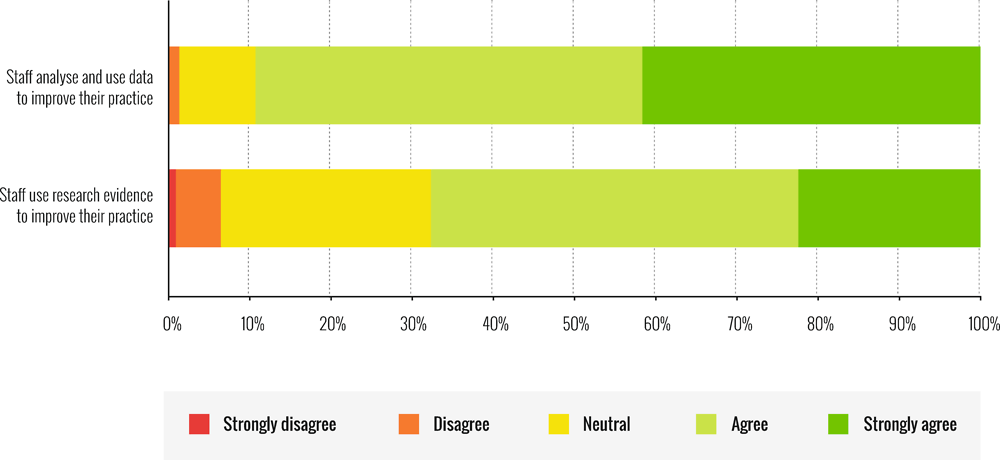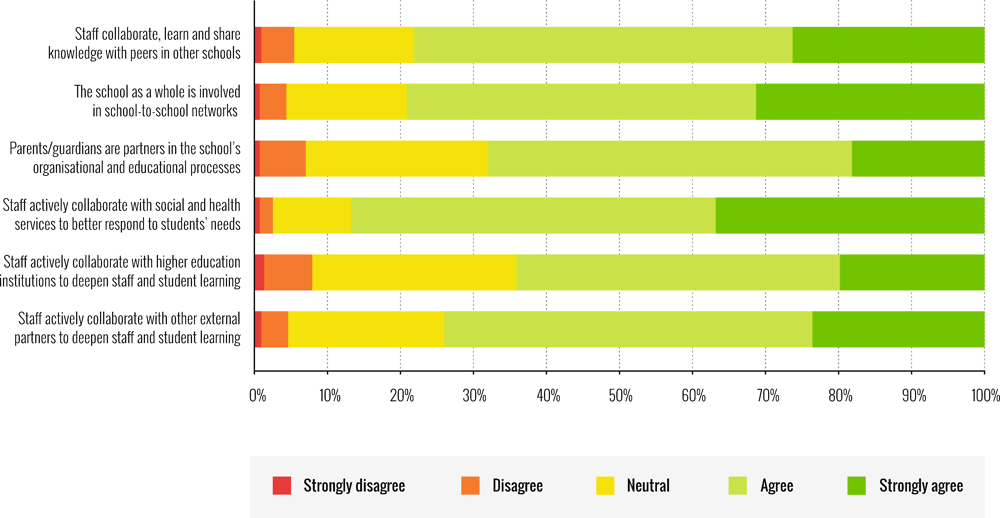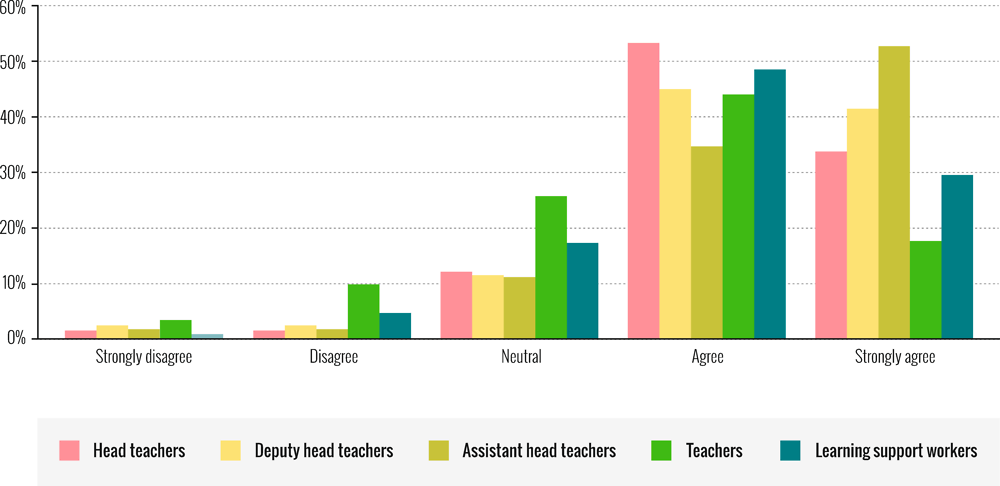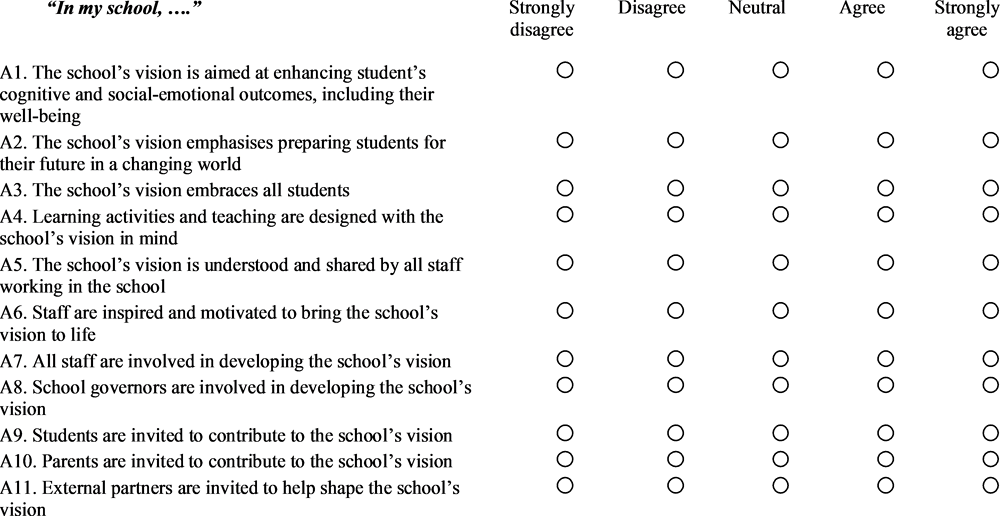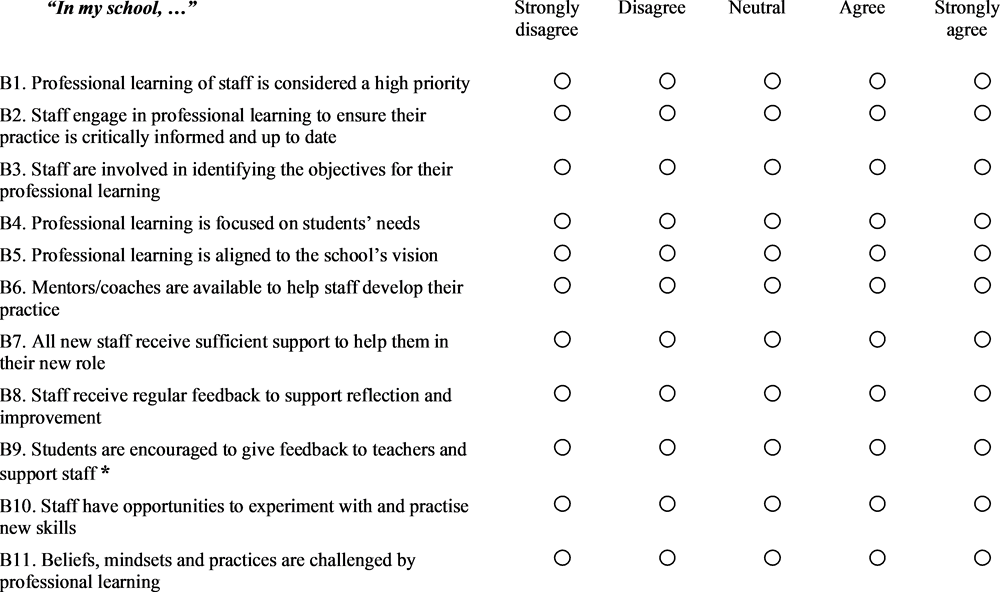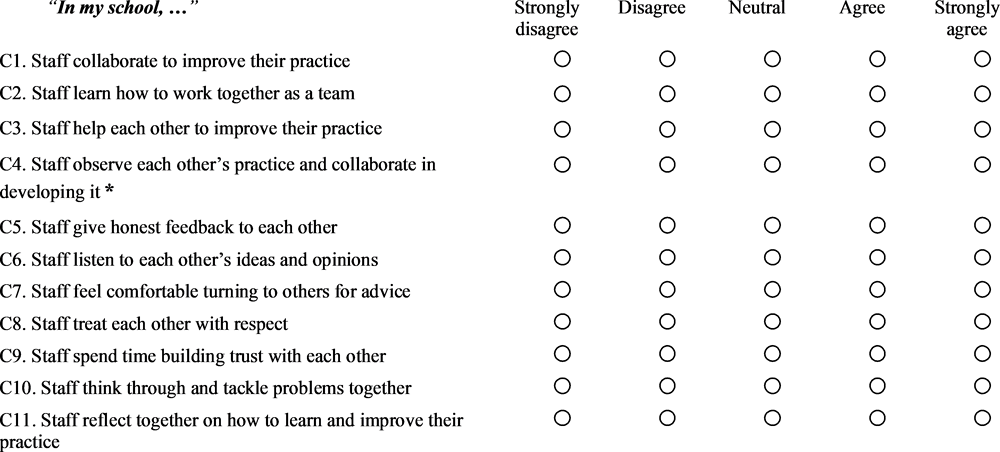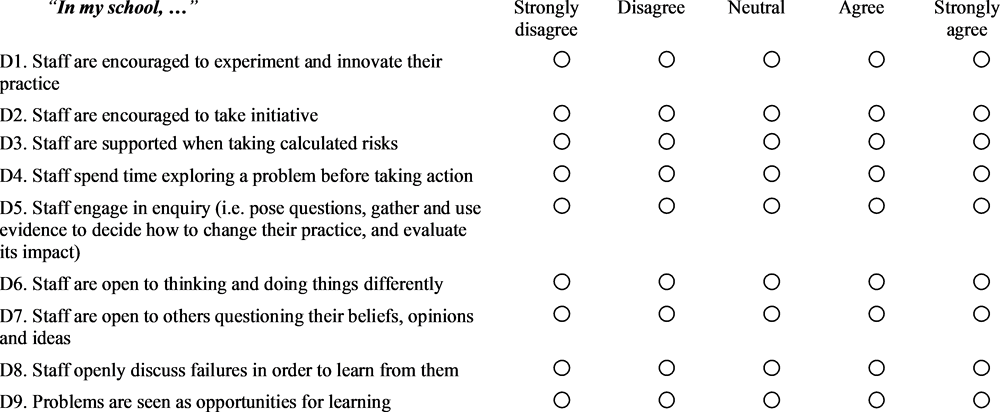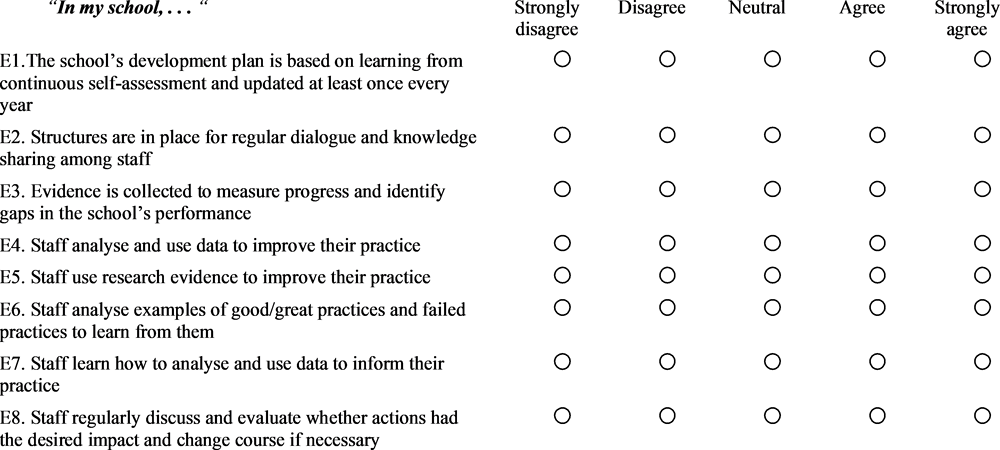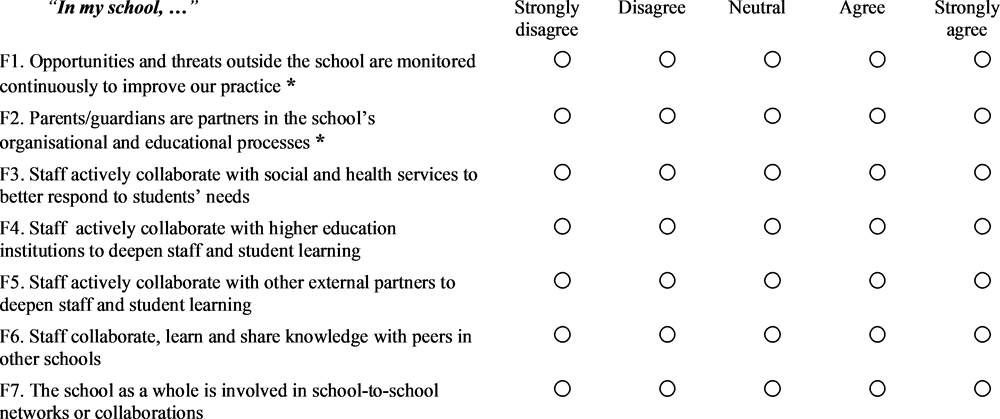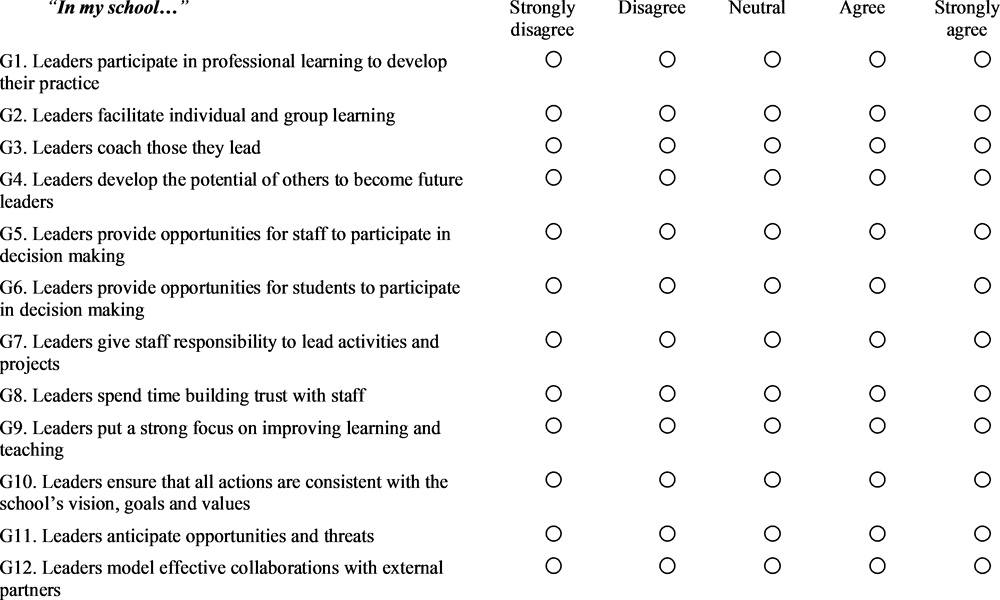[25] Borgonovi, F. and G. Montt (2012), “Parental involvement in selected PISA countries and economies”, OECD Education Working Papers, No. 73, OECD Publishing, Paris, http://dx.doi.org/10.1787/5k990rk0jsjj-en.
[26] Byrne, D. and E. Smyth (2010), Behind the Scenes? A Study of Parental Involvement in Post-Primary Education, Liffey Press, Dublin.
[12] Caprara, G. et al. (2006), “Teachers’ self-efficacy beliefs as determinants of job satisfaction and students’ academic achievement: A study at the school level”, Journal of School Psychology, Vol. 44/6, pp. 473-490.
[31] Cerna, L. (2014), “Trust: What it is and why it matters for governance and education”, OECD Education Working Papers, No. 108, OECD Publishing, Paris, http://dx.doi.org/10.1787/5jxswcg0t6wl-en.
[29] Darling-Hammond, L., M. Hyler and M. Gardner (2017), Effective Teacher Professional Development, Learning Policy Institute, Palo Alto..
[27] Desforges, C. and A. Abouchaar (2003), “The impact of parental involvement, parental support and family education on pupil achievements and adjustment: A literature review”, Research Report, No. No. 433, Department for Education and Skills Publications, Nottingham.
[3] Donaldson, G. (2015), Successful Futures: Independent Review of Curriculum and Assessment Arrangements in Wales, Welsh Government, http://gov.wales/docs/dcells/publications/150225-successful-futures-en.pdf.
[38] Enticott, G., G. Boyne and R. Walker (2008), “The use of multiple informants in public administration research: Data aggregation using organizational echelons”, Journal of Public Administration Research and Theory, Vol. 19/2, pp. 229-253.
[10] Erdem, M., A. İlğan and H. Uçar (2014), “Relationship between learning organization and job satisfaction of primary school teachers”, International Online Journal of Educational Sciences, Vol. 6/1, pp. 8-20, http://dx.doi.org/10.15345/iojes.2014.01.002.
[21] Estyn (2018), The Annual Report of Her Majesty's Chief Inspector of Education and Training in Wales 2016-2017, Estyn, Cardiff, https://www.estyn.gov.wales/document/annual-report-2016-2017.
[36] Fullan, M. (2014), The Principal: Three Keys to Maximizing Impact, Jossey-Bass and Ontario Principal’s Council, Toronto.
[39] George, B. and S. Desmidt (2018), “Strategic-decision quality in public organizations: An information processing perspective”, Administration & Society, Vol. 50/1, pp. 131-156, http://dx.doi.org/10.1177/0095399716647153.
[42] George, B. and S. Pandey (2017), “We know the yin—but where is the yang? Toward a balanced approach on common source bias in public administration scholarship”, Review of Public Personnel Administration, Vol. 37/2, pp. 245-270.
[43] Giles, C. and A. Hargreaves (2006), “The sustainability of innovative schools as learning organizations and professional learning communities during standardized reform”, Educational Administration Quarterly, Vol. 42/1, pp. 124-156.
[13] Klassen, R. and M. Chiu (2010), “Effect on teachers’ self-efficacy and job satisfaction: Teacher gender, years of experience, and job stress”, Journal of Educational Psychology, Vol. 102/3, pp. 741-756.
[18] Kools, M. and L. Stoll (2016), “What makes a school a learning organisation?”, OECD Education Working Papers, No. 137, OECD Publishing, Paris, http://dx.doi.org/10.1787/5jlwm62b3bvh-en.
[45] Kools, M. et al. (2018), The School as a Learning Organisation and its Measurement, OECD Publishing, Paris.
[16] Day, C. and K. Leithwood (eds.) (2007), Starting with What We Know, Springer, Dordrecht.
[37] Marsick, V. and K. Watkins (1999), Facilitating Learning Organizations: Making Learning Count, Gower Publishing Limited, Aldershot.
[41] McNabb, D. (2015), Research Methods in Public Administration and Nonprofit Management (second edition), Routledge, New York.
[24] OECD (2017), PISA 2015 Results (Volume III): Students' Well-Being, PISA, OECD Publishing, Paris, http://dx.doi.org/10.1787/9789264273856-en.
[20] OECD (2017), The Welsh education reform journey: A rapid policy assessment, OECD, Paris, http://www.oecd.org/edu/The-Welsh-Education-Reform-Journey-FINAL.pdf.
[23] OECD (2016), PISA 2015 Results (Volume I): Excellence and Equity in Education, PISA, OECD Publishing, Paris, http://dx.doi.org/10.1787/9789264266490-en.
[32] OECD (2016), PISA 2015 Results (Volume II): Policies and Practices for Successful Schools, PISA, OECD Publishing, https://doi.org/10.1787/9789264267510-en (accessed on 06 November 2017).
[19] OECD (2014), Improving Schools in Wales: An OECD Perspective, OECD Publishing, Paris, http://www.oecd.org/edu/Improving-schools-in-Wales.pdf.
[35] OECD (2013), Innovative Learning Environments, Educational Research and Innovation, OECD Publishing, Paris, http://dx.doi.org/10.1787/9789264203488-en.
[34] OECD (2013), Synergies for Better Learning: An International Perspective on Evaluation and Assessment, OECD Reviews of Evaluation and Assessment in Education, OECD Publishing, Paris, http://dx.doi.org/10.1787/9789264190658-en.
[11] Razali, M., N. Amira and N. Shobri (2013), “Learning organization practices and job satisfaction among academicians at public niversity”, International Journal of Social Science and Humanity, Vol. 3/6, pp. 518-521, http://dx.doi.org/10.7763/IJSSH.2013.V3.295.
[17] Robinson, V. (2007), The Impact of Leadership on Student Outcomes: Making Sense of the Evidence, http://research.acer.edu.au/research_conference_2007/5/.
[7] Schechter, C. (2008), “Organizational learning mechanisms: The meaning, measure, and implications for school improvement”, Educational Administration Quarterly, Vol. 44/2, pp. 155-186.
[9] Schechter, C. and M. Qadach (2012), “Toward an organizational model of change in elementary schools: The contribution of organizational learning mechanisms”, Educational Administration Quarterly, Vol. 48/1, pp. 116-153, http://dx.doi.org/10.1177/0013161X11419653.
[22] Schlechty, P. (2009), Leading for Learning: How to Transform Schools into Learning Organizations, John Wiley & Sons.
[28] Schleicher, A. (2018), World Class: How to Build a 21st-Century School System, OECD Publishing, Paris, http://dx.doi.org/10.1787/4789264300002-en.
[4] Senge, P. et al. (2012), Schools That Learn (Updated and Revised): A Fifth Discipline Fieldbook for Educators, Parents, and Everyone Who Cares about Education, Crown Business.
[14] Silins, H. and B. Mulford (2004), “Schools as learning organizations: Effects on teacher leadership and student outcomes”, School Effectiveness and School Improvement, Vol. 15, pp. 443-466, https://doi.org/10.1080/09243450512331383272.
[8] Silins, H., B. Mulford and S. Zarins (2002), “Organizational learning and school change”, Educational Administration Quarterly, Vol. 38/5, pp. 613-642.
[5] Silins, H., S. Zarins and B. Mulford (2002), “What characteristics and processes define a school as a learning organisation? Is it a useful concept to apply to schools?”, International Education Journal, Vol. 3/1, pp. 24-32.
[30] Thompson, M. et al. (2004), “Study of the impact of the California Formative Assessment and Support System for Teachers, Report 1: Beginning teachers' engagement with BTSA/CFASST”, ETS Research Report Series, No. RR-04-30, Educational Testing Service.
[15] Timperley, H. et al. (2007), Teacher Professional Learning and Development: Best Evidence Synthesis Iteration, Ministry of Education New Zealand, Wellington.
[6] Watkins, K. and V. Marsick (1999), “Sculpting the learning community: New forms of working and organizing”, NASSP Bulletin, Vol. 83/604, pp. 78-87, https://doi.org/10.1177/019263659908360410.
[33] Watkins, K. and V. Marsick (1996), In Action: Creating the Learning Organization, American Society for Training and Development, Alexandria.
[40] Welsh Government (2018), School Staff, StatsWales website, https://statswales.gov.wales/Catalogue/Education-and-Skills/Schools-and-Teachers/teachers-and-support-staff/School-Staff.
[1] Welsh Government (2017), Education in Wales: Our National Mission: Action Plan 2017-21, Education Wales, Welsh Government, http://gov.wales/docs/dcells/publications/170926-education-in-wales-en.pdf.
[44] Welsh Government (2017), School Census Results, 2017, Statistics for Wales, https://gov.wales/docs/statistics/2017/170726-school-census-results-2017-en.pdf.
[2] Welsh Government (2017), Schools in Wales as Learning Organisations, Welsh Government website, https://beta.gov.wales/schools-learning-organisations.

